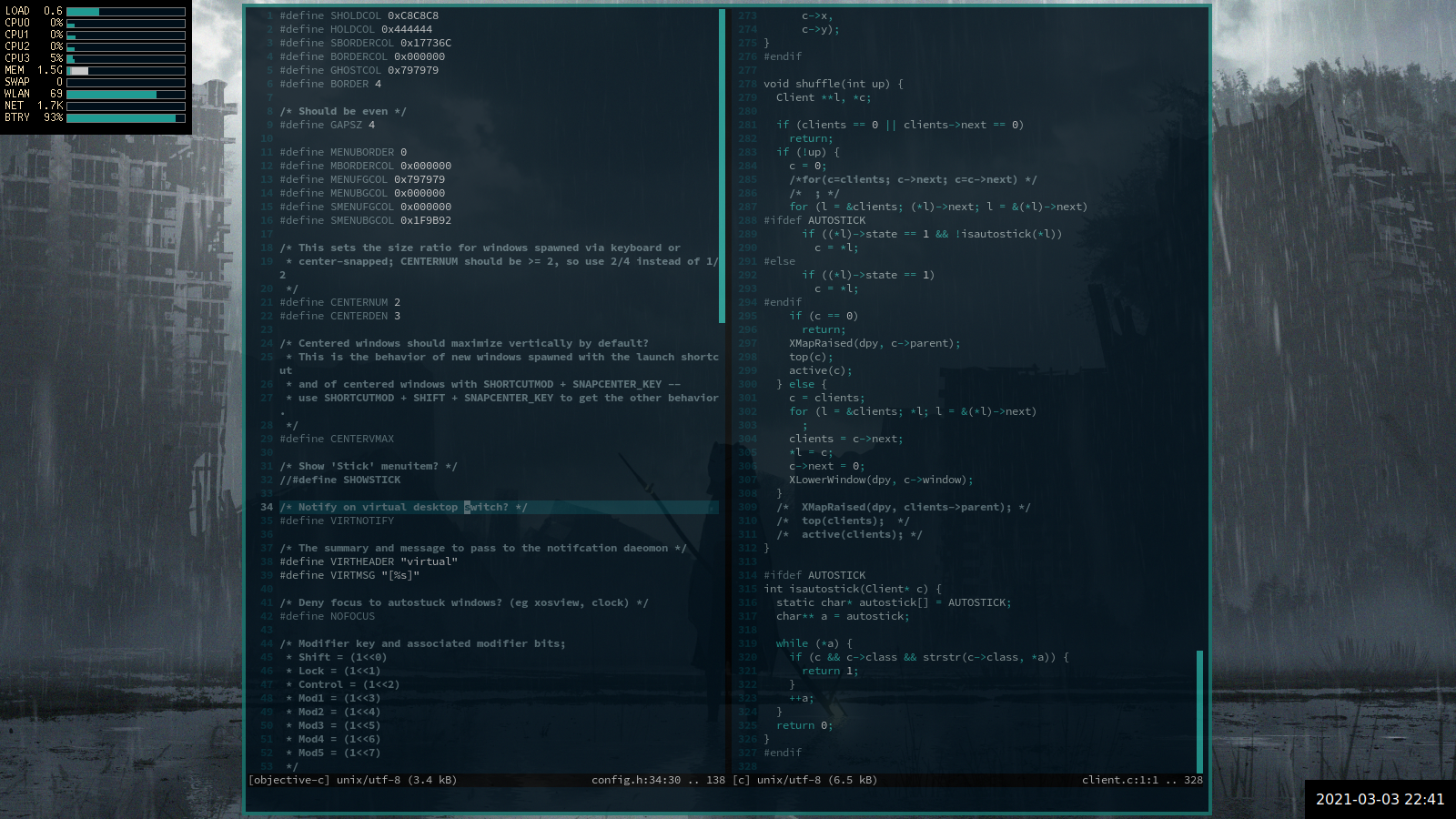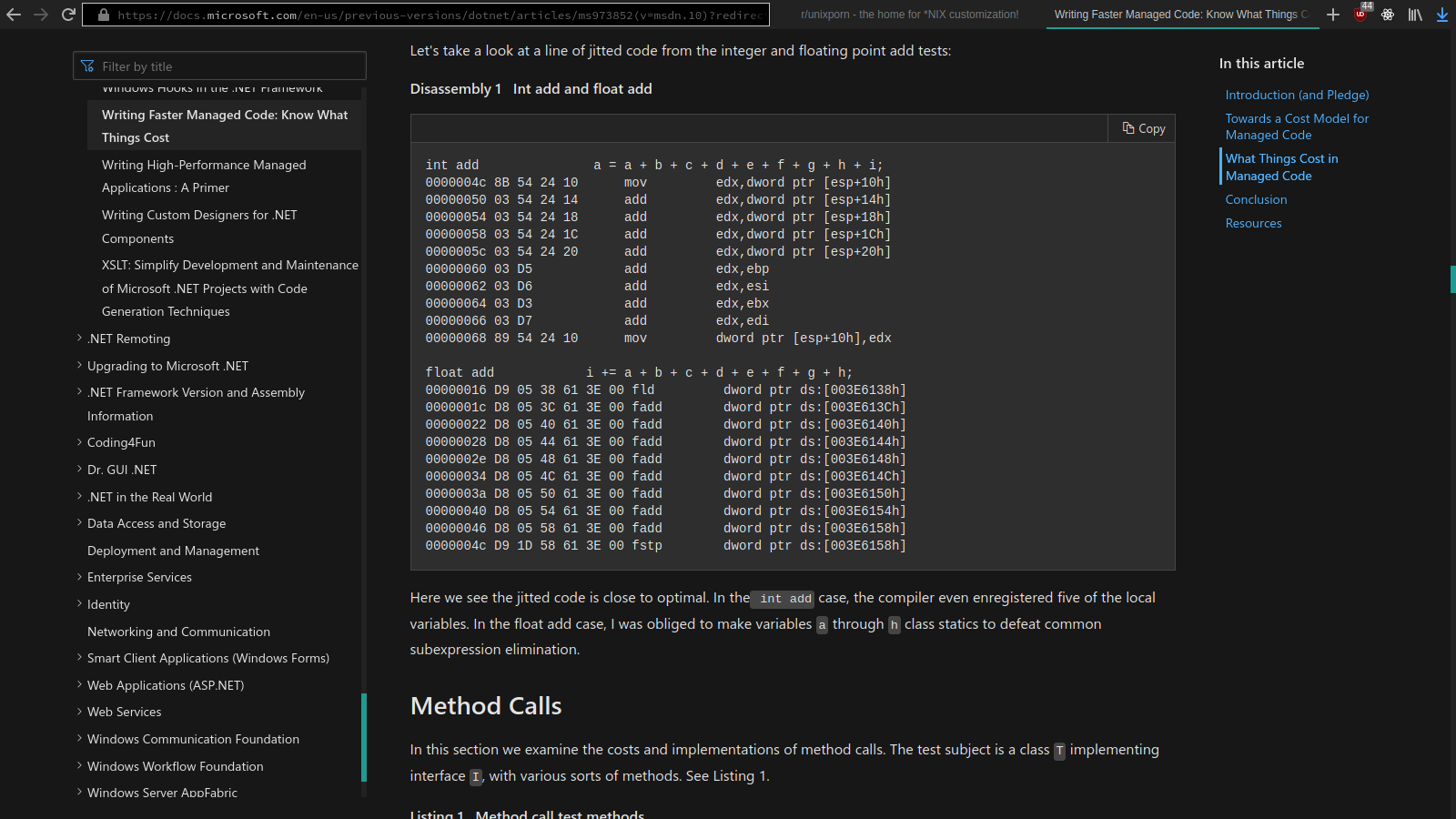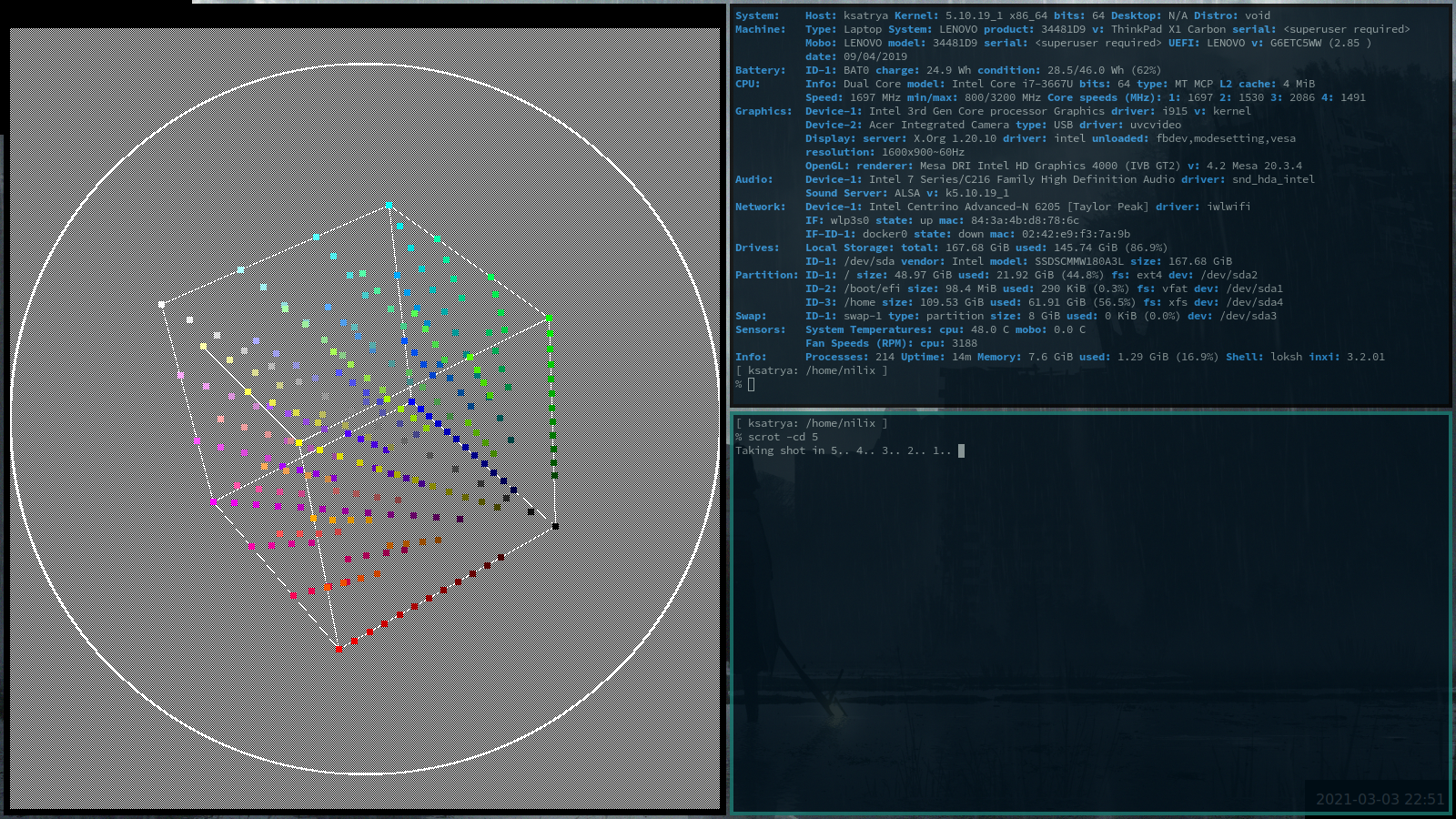| screenshots | ||
| showevent | ||
| .clang-format | ||
| .gitignore | ||
| build.sh | ||
| client.c | ||
| color.c | ||
| config.def.h | ||
| cursor.c | ||
| dat.h | ||
| error.c | ||
| event.c | ||
| fns.h | ||
| grab.c | ||
| install.sh | ||
| key.c | ||
| main.c | ||
| manage.c | ||
| menu.c | ||
| mkfile | ||
| mkriorules.sh | ||
| patchlevel.h | ||
| printevent.c | ||
| printevent.h | ||
| README.md | ||
| rio.c | ||
| ryudo.1 | ||
| ryudo.1.html | ||
| ryudo.1.md | ||
| ryudo.desktop | ||
| startryudo | ||
| xevents.c | ||
| xshove.c | ||
RYUDO
the minimalist floatiling window manager that flows
-- Derek Stevens nilix@nilfm.cc 2019 --
About
ryudo is a fork of Russ Cox's Rio, itself a fork of David Hogan's 9wm.
The primary additions I've made are:
urxvt,konsole, andAlacrittyare detected as proper terminal programs for sweeping out new windowsurxvtis the default terminal emulator (still tries9termand thenxtermif no dice)- Window spawning behavior has been made more natural -- windows shouldn't spawn partially offscreen like with
rio - Customizable colors, borders, fonts, gaps, and keybinds in
config.h - Default keybindings:
- New Terminal: Super+Slash
- Destroy: Super+D
- Iconify: Super+I
- Uniconify: Super+U
- Maximize: Super+M
- moVe: Super+V
- Reshape: Super+R
- Stick: Super+S
- Snap Left: Super+H
- Snap Right: Super+L
- Snap Top: Super+K
- Snap Bottom: Super+J
- Snap Top-Left: Super+Q
- Snap Bottom-Left: Super+W
- Snap Bottom-Right: Super+O
- Snap Top-Right: Super+P
- Snap Big Center: Super+C
- Snap Floating Center: Super+Shift+C
- Virtual Desk++: Super+Right
- Virtual Desk--: Super+Left
- Other new features customizable by
config.h:- Show/hide 'Stick' Button3 menuitem
AUTOSTICKlist of windows to spawn sticky by default and not focus (pseudo-panel/dock windows)TRANSPARENTLISTof window classes to be rendered with partial transparency (and corresponding OPACITY setting)- Optionally notify with
notify-sendwhich desktop is switched to (I use it withdunst) - Gaps for pseudo-tiling
- Option to swap the keyboard shortcuts between "Snap Big Center" and "Snap Floating Center" (and the preferred behavior for terminals launched by keyboard)
The name "Ryudo" is a nod to "Rio" and a Japanese word for "flow."
Using Ryudo should feel very natural -- you can do things with keyboard or
mouse depending on the situation. Terminal launching can be done with mouse
using the popup menu, or using the keyboard, which will spawn a terminal
window centered (its exact geometry is configurable via config.h).
Dependencies, Building, Installation
Being forked from Rio, Ryudo requires plan9port, Xlib, and Xt.
If you enable notifications, they need libnotify.
(With the exception of plan9port, you need the development headers for all the dependencies in addition to the libraries themselves in order to compile).
Build with build.sh (calls mk and does some other magic), and install with install.sh (will install to a local folder if run as a normal user, or to your $PLAN9/bin/ plus session wrapper in /usr/bin and .desktop file in /usr/share/xsessions/ if run as root).
If you have trouble building, you might need to edit the mkfile at line 2
to point to the proper location of your plan9port's mkwsysrules.sh.
Bugs and Caveats
Of the bugs and caveats not already mentioned in Rio's readme:
- Rendering of windows with RGBA surfaces is bound to RGB space (ie, transparency cannot be set on a per-pixel level beyond a binary resolution)
- Switching back and forth between virtual desktops very quickly can cause some windows to glitch out, lose their parent, and become unfocusable (doesn't happen if switching just in one direction).
- Multimonitor setups are treated like one giant monitor. This is on the short list.
- Some applications that render fullscreen or dedicated OSD windows (Virtualbox, Zoom, etc) will need to be manually maximized to fix their alignment (in the former case) or otherwise misbehave.
- Probably more!
Legacy
This is David Hogan's 9wm updated to behave more like Plan 9's rio. Since I cannot get approval for the changes and I'd prefer not to resort to patches, I have renamed it "rio".
Current incompatibilities that would be nice to fix:
-
The command-line options should be made more like Plan 9.
-
Should work out a protocol between 9term and rio so that:
- 9term can tell rio to blue its border during hold mode
-
Should change window focus on b2/b3 clicks and then pass along the click event to the now-focused window.
-
Should change 9term to redirect b3 clicks to rio so that rio can put up the usual b3 menu.
Axel Belinfante contributed the code to handle border grabbing for resize and various other improvements.
The original README is below.
-
russ cox rsc@swtch.com 30 march 2004
9wm Version 1.2 Copyright 1994-1996 David Hogan.
What is 9wm?
9wm is an X window manager which attempts to emulate the Plan 9 window manager 8-1/2 as far as possible within the constraints imposed by X. It provides a simple yet comfortable user interface, without garish decorations or title-bars. Or icons. And it's click-to-type. This will not appeal to everybody, but if you're not put off yet then read on. (And don't knock it until you've tried it.)
One major difference between 9wm and 8-1/2 is that the latter provides windows of text with a typescript interface, and doesn't need to run a separate program to emulate a terminal. 9wm, as an X window manager, does require a separate program. For better 8-1/2 emulation, you should obtain Matthew Farrow's "9term" program (ftp://ftp.cs.su.oz.au/matty/unicode), version 1.6 or later (earlier versions don't cooperate with 9wm in implementing "hold mode"). Of course, you can run xterm under 9wm as well.
What is 9wm not?
9wm is not a virtual window manager. It is not customisable to any great extent. It is not large and unwieldy, and doesn't use the X toolkit. Requests to make it any of these things will be silently ignored (or flamed if I have had a bad day :-) If you want tvtwm or mwm, you know where to get them...
Where do I get it?
The latest version of 9wm is held at ftp://ftp.cs.su.oz.au/dhog/9wm
Author
9wm was written by David Hogan (dhog@cs.su.oz.au), a postgraduate student at the Basser Department of Computer Science, University of Sydney (http://www.cs.su.oz.au/~dhog/).
Licence
9wm is free software, and is Copyright (c) 1994-1996 by David Hogan. Permission is granted to all sentient beings to use this software, to make copies of it, and to distribute those copies, provided that:
(1) the copyright and licence notices are left intact
(2) the recipients are aware that it is free software
(3) any unapproved changes in functionality are either
(i) only distributed as patches
or (ii) distributed as a new program which is not called 9wm
and whose documentation gives credit where it is due
(4) the author is not held responsible for any defects
or shortcomings in the software, or damages caused by it.
There is no warranty for this software. Have a nice day.
How do I compile/install it?
Assuming your system is correctly configured, you should only need to run xmkmf to generate the Makefile, and then run make or make install. make install.man should copy the manpage (9wm.man) to the appropriate directory.
If the make fails, complaining that the function _XShapeQueryExtension does not exist, try removing the "-DSHAPE" from the Imakefile, and run xmkmf and make again.
If you don't have imake, or it is misconfigured, or you would prefer not to use it, try copying the file "Makefile.no-imake" to "Makefile", then edit the definitions in this Makefile to suit your system. This may require defining suitable compilation flags for your system (normally imake does this for you). For instance, on AIX you must include "-DBSD_INCLUDES" in CFLAGS.
How do I use it?
See the manual page for details. You should probably read the man page for 9term as well.
What if I find a bug?
Please mail all bug reports to 9wm-bugs@plan9.cs.su.oz.au, so that I can incorporate fixes into the next release. If you can tell me how to fix it, all the better.
Known Problems/Bugs
9wm tries hard to emulate 8-1/2, but isn't 100% compatible. If you are an experienced 8-1/2 user, please be patient with it.
One intentional difference between 9wm and 8-1/2 is in the behaviour of the menu when the last hidden item is unhidden. Under 8-1/2, when the menu is next used, it pops up with "New" selected. Under 9wm, the (new) last menu item will be selected. This is a feature. It may be confusing if you frequently switch between 9wm and 8-1/2. If you don't like this feature, email me for the one line fix.
There have been some problems encountered when resizing 9term on some platforms. This turns out to be a problem in 9term (actually in libXg, to be precise). Newer versions of 9term should be immune to this, see matty@cs.su.oz.au if your 9term needs fixing.
Some client programs do weird things. One of these is Frame Maker. It appears that if it has a modal dialog on the screen, then if any of its windows are current, all keypresses are redirected to the modal dialog. This is not 9wm's fault -- Frame Maker is doing this.
Programs like Netscape Navigator like to put riddiculously long icon name properties on their windows, of the form "Netscape: blah blah". There is no way that I know of to stop netscape from doing this. For this reason, 9wm truncates labels at the first colon it finds. This keeps the button 3 menu from becoming excessively wide. Note that with same applications, you can use an iconName resource to set the label; this works well for "xman", whose default icon name of "Manual Browser" is a tad too long.
See Also
http://www.cs.su.oz.au/~dhog/ The 9wm Home Page
ftp://ftp.cs.su.oz.au/matty/unicode/ for source to 9term (get README first)
ftp://plan9.att.com/plan9/unixsrc/sam/ for source && info on Rob Pike's editor "sam"
ftp://rtfm.mit.edu/pub/usenet/news.answers/unix-faq/shell/rc for information on a publically available implementation of the Plan 9 shell "rc" for unix (or look in comp.unix.shell).
ftp://viz.tamu.edu/pub/rc for source to the abovementioned implementation of rc.
http://plan9.att.com/plan9/ http://plan9.att.com/magic/man2html/1/8%c2%bd for information on Plan 9 (including the 8-1/2 manual entry)
Acknowledgements
Thanks to Rob Pike for writing the original 8-1/2 program (and before that, mux) which inspired the writing of 9wm.
Thanks to John Mackin, whose gwm "wool code" for emulating mux was also an inspiration: I used it (and hacked it) until I got too frustrated with gwm's large memory requirements and lack of speed (sorry Colas!), and decided to write a dedicated program.
Thanks to Matthew Farrow for writing 9term.
A big thanks to Dave Edmondson for adding support for multi-screen displays.
The following people helped beta test 9wm:
John Mackin
Noel Hunt
Fred Curtis
James Matthew Farrow
Danny Yee
Arnold Robbins
Byron Rakitzis
micro@cooper.edu



